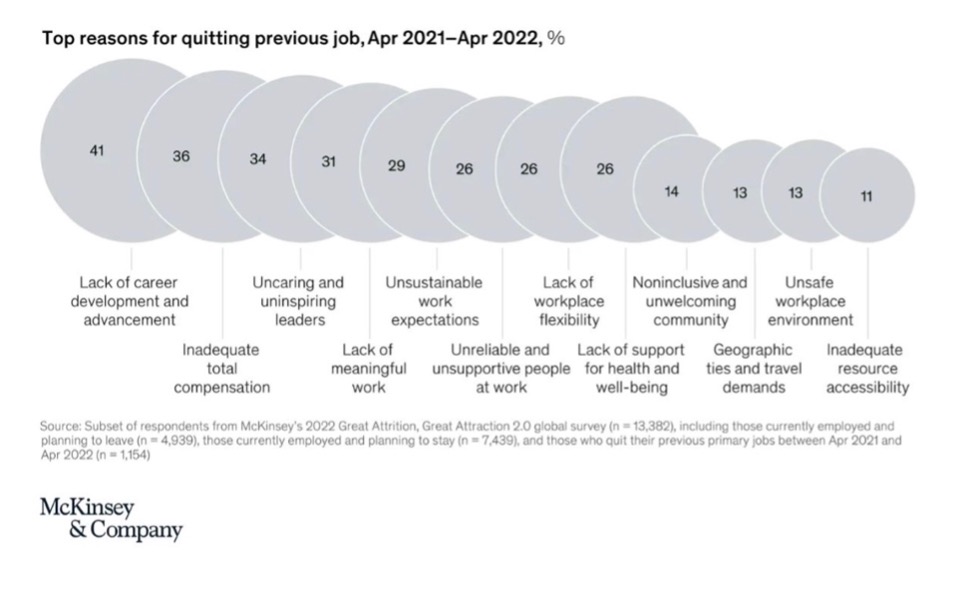
Over the years, I’ve heard several managers, CEOs and leaders say that what they need to unlearn is what they learned in their MBA. Are many of the teachings outdated? Did you know it takes six years to publish textbooks for university level studies?
In the last decade, the speed of information has increased tremendously, and we are in informational overload. Podcasts are one of the very popular means for younger generations to learn[i]. And growing up with instant feedback through social media reactions and comments, we have a large part of the workplace that is looking for and needs feedback often. According to Gallup, Gen Y and Gen Z are also the most educated and least experienced group that will soon be dominating the workplace—75% of the workforce by 2025!
The global trauma of the pandemic has led people to reevaluate their lives and priorities. People want flexibility and quality of life. Employees are not willing to tolerate toxic leaders or cultures. This is the underlying cause for the great resignation, quiet quitting, and the open discussions on mental health, well-being, diversity and inclusion, etc.
It’s almost causing the perfect storm for companies and leaders right now. Many are struggling to keep and find great talent. CEOs have a legitimate concern about not having the right talent to reach their three-to-five-year objectives.
As leaders search to find solutions, the “old ways” don’t seem to be working. Spiffing up the benefits, increasing salaries, etc might have worked a few years ago but these are short term solutions that will not have a lasting impact on talent attraction and retention. It’s like putting a band aid on a gaping wound.
Recent research from Universum[ii] shows that in the last year “higher future earnings” moved from number two to number one. This was more dominant for males versus females, where it ranked number four. “Leaders who will support my development” moved from the top slot to number two overall but remained the number one for females. A study from McKinsey show that the main reason people are leaving their jobs (41%) is due to lack of career advancement and development.

At Evoloshen, we believe in getting to the root cause of all these issues to work on solutions that help create higher engagement and higher levels of trust which leads to higher productivity, higher profits, and a greater positive impact. We like to call this the “inner work” on an organizational level. Each company culture is unique and it is good to use a multi-prong approach to making culture work for you, whether it is developing your people, coaching leaders, focusing on engagement activities, etc. (Reach out to us if you’d like to discuss HOW to work with your culture strategically to get results.)
Progressive leaders know that company culture is a business asset. It is possible to make it measurable and tangible. When leaders understand the value of their people, and truly desire to create an environment where people will thrive, many of the other issues get taken care of naturally.
One of the CEOs I love to feature is Jason Lippert at LCI, a publicly traded company with over 15,000 employees. He has taken the company through a cultural transformation over the last decade. In a manufacturing industry with high attrition, they were able to reduce employee turnover over 75% by deliberately focusing on their people. Jason regularly has listening sessions to hear directly from his people on the factory floor, which sends a message that he truly cares about them. When Jason decided to prioritize culture, he allocated resources to develop both a culture and leadership development team and a community impact team. The culture team focuses on developing their people and cultivating their culture. The community impact team works actively on how they can have a positive impact in their local communities. Rather than adding these tasks to HR or managers who are already overloaded, Jason opted to use people who can focus 100% of their time on this, which been instrumental in their growth. The company has grown from $1B to over $5B in annual revenues over the last decade. Jason attributes this to prioritizing culture first and the profits follow. You can listen to Jason explain this directly here.
Even though we may be in a chaotic storm right now, companies that are focusing on their culture, and developing their leaders and people, are creating great company cultures. This gives their people a safe haven, a workplace where they want to stay longer, and a company culture that attracts great talent.
Savvy leaders understand the value of their people, the importance of creating a great culture, and using their business as a force for good. And those companies are easily rising to the top and will succeed long term. The bottom line is that culture IS the competitive advantage right now!
[i] https://explodingtopics.com/blog/gen-z-trends
[ii] https://universumglobal.com/se/ranking-professionals-2022/






